
Randolph Charles Bachman is a Canadian guitarist, singer, and songwriter. He was a founding member of the bands The Guess Who and Bachman–Turner Overdrive. Bachman recorded as a solo artist and was part of a number of short-lived bands such as Brave Belt, Union and Ironhorse. He was a national radio personality on CBC Radio, hosting the weekly music show, Vinyl Tap. Bachman was inducted into the Musicians Hall of Fame and Museum in 2016.
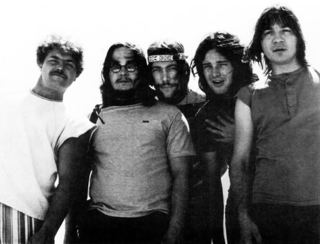
The Guess Who are a Canadian rock band formed in Winnipeg, Manitoba, in 1965. The band originated in 1962 and achieved an international hit single with a cover of "Shakin' All Over" in 1965 under the name Chad Allan and the Expressions. After changing their name to The Guess Who, they found their greatest success in the late 60s and early 70s, under the leadership of singer/keyboardist Burton Cummings and guitarist Randy Bachman, with hit songs including "American Woman", "These Eyes", and "No Time".

Burton Lorne Cummings is a Canadian musician. He is best known for leading The Guess Who during that band's most successful period from 1965 to 1975, and for a lengthy solo career.

"Rebel Rebel" is a song by English singer-songwriter David Bowie. It was released in the UK in February 1974 by RCA Records as the lead single from the album Diamond Dogs. Written and produced by Bowie, the song is based around a distinctive guitar riff reminiscent of the Rolling Stones. Cited as his most-covered track, "Rebel Rebel" has been described as Bowie's farewell to the glam rock movement that he had helped initiate, as well as being a proto-punk track. Two versions of the song were recorded: the well-known UK single release and the shorter US single release, which featured added background vocals, extra percussion and a new arrangement.

Oh What a Feeling: A Vital Collection of Canadian Music is a 4-CD box set released in 1996 to celebrate the 25th anniversary of the Juno Awards. A second box set, Oh What a Feeling 2, was released in 2001 to mark the awards' 30th anniversary, and a third set, Oh What a Feeling 3, was released in 2006 for the 35th anniversary. All of the sets feature popular Canadian songs from the 1960s onward. The sets were titled for the song "Oh What a Feeling" by rock band Crowbar. The original 25th anniversary box set peaked at No. 3 on the Canadian Albums Chart and was certified Diamond in Canada.

"Fame" is a song recorded by English singer-songwriter David Bowie. It was released on his 1975 album Young Americans and was later issued as the album's second single by RCA Records in June 1975. Written by Bowie, Carlos Alomar and John Lennon, it was recorded at Electric Lady Studios in New York City in January 1975. It is a funk rock song that represents Bowie's dissatisfaction with the troubles of fame and stardom.

"Let's Spend the Night Together" is a song written by Mick Jagger and Keith Richards, and originally released by the Rolling Stones as a double A-sided single together with "Ruby Tuesday" in January 1967. It also appears as the opening track on the American version of their album Between the Buttons. The song has been covered by various artists, including David Bowie in 1973.
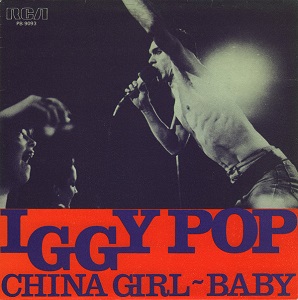
"China Girl" is a song written by Iggy Pop and David Bowie during their years in Berlin, first appearing on Pop's debut solo album, The Idiot (1977). The song became more widely known when it was re-recorded by Bowie, who released it as the second single from his most commercially successful album, Let's Dance (1983). The UK single release of Bowie's version reached No. 2 for one week on 14 June 1983, while the US release reached No. 10.
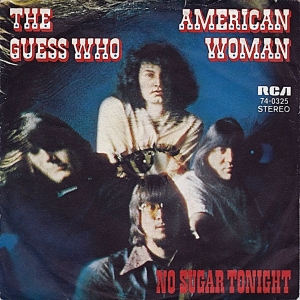
"American Woman" is a song by Canadian rock band the Guess Who, released January 1970, from the album of the same name. It was later released in March 1970 as a single backed with "No Sugar Tonight", and it reached number one for three weeks commencing May 9 on both the United States' Billboard Hot 100 and the Canadian RPM magazine singles chart. Billboard magazine placed the single at number three on the Year-End Hot 100 singles of 1970 list, and it was listed as number five for 1970 on the RPM Year-End Chart. On May 22, 1970, the single was certified as gold by the Recording Industry Association of America (RIAA). It also reached the top ten in the Netherlands, Switzerland and Austria, and the top twenty in the United Kingdom and New Zealand.
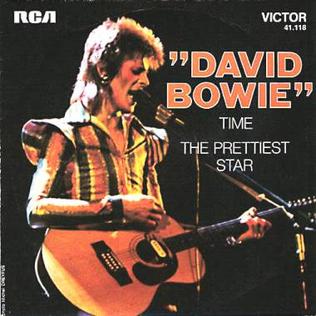
"Time" is a song by English singer-songwriter David Bowie. Written in New Orleans in November 1972 during the American leg of the Ziggy Stardust Tour, it was recorded in London in January 1973 and released as the opening track on side two of the album Aladdin Sane that April. An edited version of the song supplanted the release of the single "Drive-In Saturday" in the United States, Canada and Japan. It was also released in France and South Africa, while early Spanish copies of David Live included a free copy of the single.
"No Sugar Tonight/New Mother Nature" is a medley by the Canadian rock band The Guess Who. It was released on their 1970 album American Woman, and was released on the B-side of the "American Woman" single without the "New Mother Nature" section. The single was officially released as "American Woman/No Sugar Tonight" and peaked at #1 on the RPM magazine charts and #1 on the Billboard Hot 100, for three weeks on both charts. In Cash Box, which at the time ranked sides of singles independently, "No Sugar Tonight" reached #39.
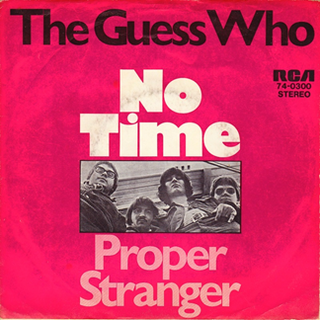
"No Time" is a song by Canadian rock band The Guess Who, composed by guitarist Randy Bachman and lead singer Burton Cummings.

"Angie" is a song by the English rock band The Rolling Stones, featured on their 1973 album Goats Head Soup. It also served as the lead single on the album, released on 20 August 1973.

"Tequila Sunrise" is a 1973 song written by Don Henley and Glenn Frey, and recorded by the Eagles. It was the first single from the band's second album, Desperado. The song peaked at number 64 on the Billboard Hot 100.

"These Eyes" is a song by the Canadian rock band The Guess Who. The song was co-written by the group's lead guitarist Randy Bachman and lead singer Burton Cummings and originally included on the band's 1969 album Wheatfield Soul. It was first released as a single, in their native Canada, where its chart success (#7), along with the influence of CKLW-AM Windsor's radio station music director Rosalie Trombley, helped land them a U.S. distribution deal with RCA Records. It was then released in the U.S. in March 1969, and became a breakthrough success for the group, as it would be their first single to reach the top ten on the Billboard Pop Singles chart, peaking at number six, and would eventually be certified gold by the RIAA for sales of over one million copies. It was also a top ten hit in South Africa. While it was actually the 18th single released by the band overall, it was the first from the line-up of Cummings, Bachman, Jim Kale, and Garry Peterson as produced by Jack Richardson.
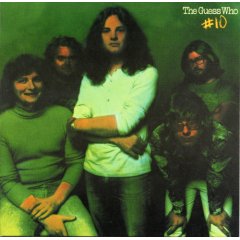
#10 is the eleventh studio album by the Canadian rock band The Guess Who. It was first released in 1973. The title comes from the fact that it was the band's tenth release for RCA Records. This number series includes both a live album and best-of compilation, but not the band's early recordings which were not recorded for RCA.

"Star Baby" is a 1974 hit song by The Guess Who. It was written by Burton Cummings who also provided the lead vocals. It is classified in the genre of Power pop and was included on the group's LP entitled, Road Food as well as The Guess Who – Greatest Hits in 1999 and The Guess Who - Anthology in 2003. The band performed the song on the Midnight Special television program on December 14, 1973.

"Hand Me Down World" is song written by Kurt Winter, performed and released in 1970 by The Guess Who, for whom Winter served as lead guitarist from 1970 to 1974 and 1977 to 1978. It reached #10 in Canada, #17 on the Billboard Hot 100, and #65 in Australia. The song was also released in the United Kingdom as a single, but did not chart. It is featured on their 1970 album, Share the Land.

"Albert Flasher" is a song written by Burton Cummings and performed by Canadian rock band The Guess Who. Initially released as the B-side of their "Broken" single in 1971, it was promoted to A-side status in mid-May of that year, according to the Billboard Hot 100 chart. It did not appear on any of their studio albums at that time, although it would much later be included on reissues of the band's 1971 album So Long, Bannatyne. It would also appear on many of their later compilation albums, including the 1973 release The Best of The Guess Who Volume II and the 1973 compilation EP titled The Guess Who. It was also performed many times in concert, including the performance captured on Live at the Paramount (1972).
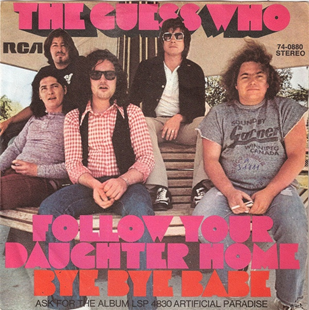
"Follow Your Daughter Home" is a song written by Burton Cummings, Donnie McDougall, Garry Peterson, Bill Wallace, and Kurt Winter and performed by The Guess Who. It reached #20 in Canada and #61 on the Billboard Hot 100 in 1973. The song was also released in the United Kingdom as a single, but it did not chart. The song was featured on their 1973 album, Artificial Paradise. The song has a calypso-influenced melody.


















